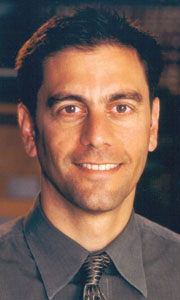 The issue of organ donation is one that is often misunderstood in the Jewish community. The next speaker in the Caviar Family Jewish Scholar in Residence Series at Kehilath Israel Synagogue will be here the weekend of March 22 to help dispel Jewish presuppositions about the halachic validity of organ donation.
The issue of organ donation is one that is often misunderstood in the Jewish community. The next speaker in the Caviar Family Jewish Scholar in Residence Series at Kehilath Israel Synagogue will be here the weekend of March 22 to help dispel Jewish presuppositions about the halachic validity of organ donation.
“A lot of people believe that Jewish law requires you to be buried whole and that’s clearly not true. Saving a life is more important than just about any commandment in the Bible,” said Robby Berman, the founder and director of the Halachic Organ Donor Society. He will speak on Friday night, March 22, and twice on Saturday, March 23.
K.I’s Rabbi Shmuly Yanklowitz has known Berman since they were both attending graduate school at Harvard.
“It became clear that his passion emerges in all he does,” Rabbi Yanklowitz said.
He wanted to bring Berman to Kansas City since he is leading “one of the most important life-saving movements in the Jewish community today. I have been shocked at how few people are informed about the Jewish approaches to end-of-life issues and organ donation responsibilities.”
Rabbi Yanklowitz is sure all who attend these discussions with Berman will be “inspired and informed about the halachic approaches to organ donation and the global impact of our choices.”
Berman was an American journalist living in Israel when he quit his writing job in 2001 and started HODS. With essentially no experience running a not-for-profit, today HODS is gaining international recognition for its important message and mission of saving lives by increasing organ donations from Jews to the general population (Jews and non-Jews alike).
The organization’s goal are:
• To educate Jews about the different halachic and medical issues concerning organ donation.
• To offer a unique organ donor card that enables Jews to donate organs according to their halachic belief.
• To provide rabbinic consultation and oversight for cases of organ transplantation.
• To match altruistic living kidney donors with recipients. (For more information, visit www.hods.org.)
Berman decided to start HODS after writing a story on organ donation.
“I was researching a story on organ donation trying to figure out why Israel has the worst organ donor registration rate in the Western world. I discovered it is because although most Israelis are secular, when it comes to major life issues like death they become religious and superstitious. Since they perceived that halachah, Jewish law, prohibits organ donation they weren’t donating. I, as an Orthodox Jew, felt an obligation to rectify this and it would not be done by writing an article,” Berman explained.
Berman has a master’s degree in public administration from the Harvard Kennedy School of Government, a Master of Business Administration degree from Baruch College, and a Bachelor of Arts degree from Yeshiva University in economics. He is also a graduate of Gruss Kollel and Yeshivat Hakotel. Berman has been a social activist for many Jewish causes, and before establishing HODS was a freelance journalist who had articles published in New York Magazine, the Jerusalem Post, Jewish Week, Moment Magazine and the Jerusalem Report.
The HODS office is in New York, but Berman lives in Jerusalem.
“So I hate it when I hear people complaining about their 45-minute commute,” he joked.
K.I. is billing Berman’s Friday night presentation, “Paying for Organs is Illegal — Is it Immoral?” as a fun audience debate. So the question posed to Berman was, “Can there really be a fun debate about organ donation?”
“It’s fun because it’s not a lecture. Lectures can be boring. Who cares about my opinion? People should listen to their own internal voice and bounce it off other people. Sharing ideas is always fun,” he explained.
In Berman’s opinion, debates about serious issues can be entertaining as can question-and-answer sessions.
“The question I most often hear comes from married women,” he said. “They want to know if they can donate their husbands’ organs before their husbands are actually dead. This would be halachicly problematic.”
As an Orthodox Jew, he does take halachah very seriously. But halachah is not clear on the issue of death. That’s why HODS created a unique donor card.
“It allows the card holder to define death either as brain-death or as cessation of heartbeat, which is the major debate in Jewish law,” Berman said.
Halachic organ donor cards are available online. It takes about five minutes to complete the form and a small registration fee is required. Cards are available on the HODS website.
Berman points out that regardless of whether you have a secular donor card or a halachic donor card, the decision to donate organs is ultimately made by your loved ones.
“Ultimately your family will make the final decision for you, so after you fill out this form please inform your family of your decision to donate your organs,” he noted.
Robby Berman details
Robby Berman, the founder and director of the Halachic Organ Donor Society, will speak at Kehilath Israel Synagogue on Friday night, March 22, and twice on Saturday, March 23.
Friday, March 22: “Paying for Organs is Illegal — Is it Immoral?” 8 p.m.
Saturday, March 23: Shabbat Services, “Organ Donation in Halachah and What is Going on in Israel,” 10:30 a.m.
Mincha-Maariv, “When is the Moment of Death?” the brain death controversy, 7:30 to 8:15 p.m.


